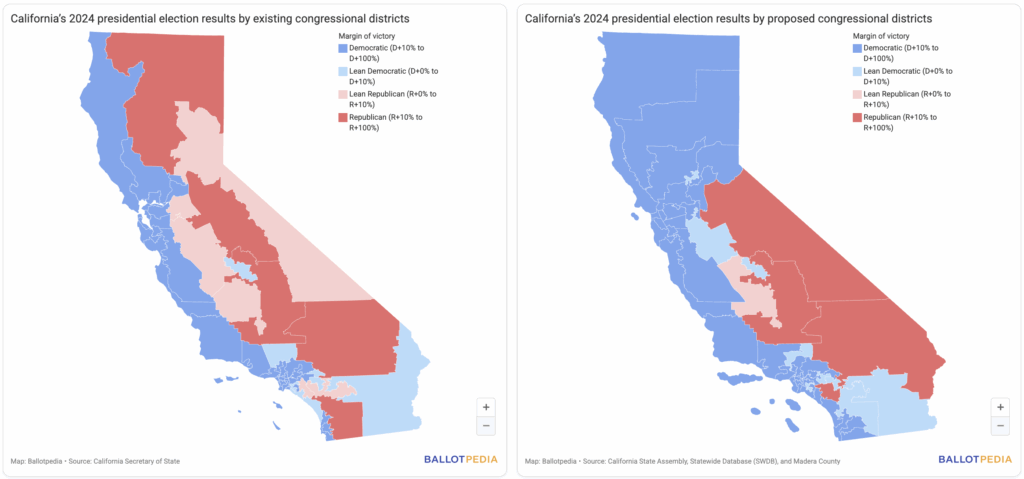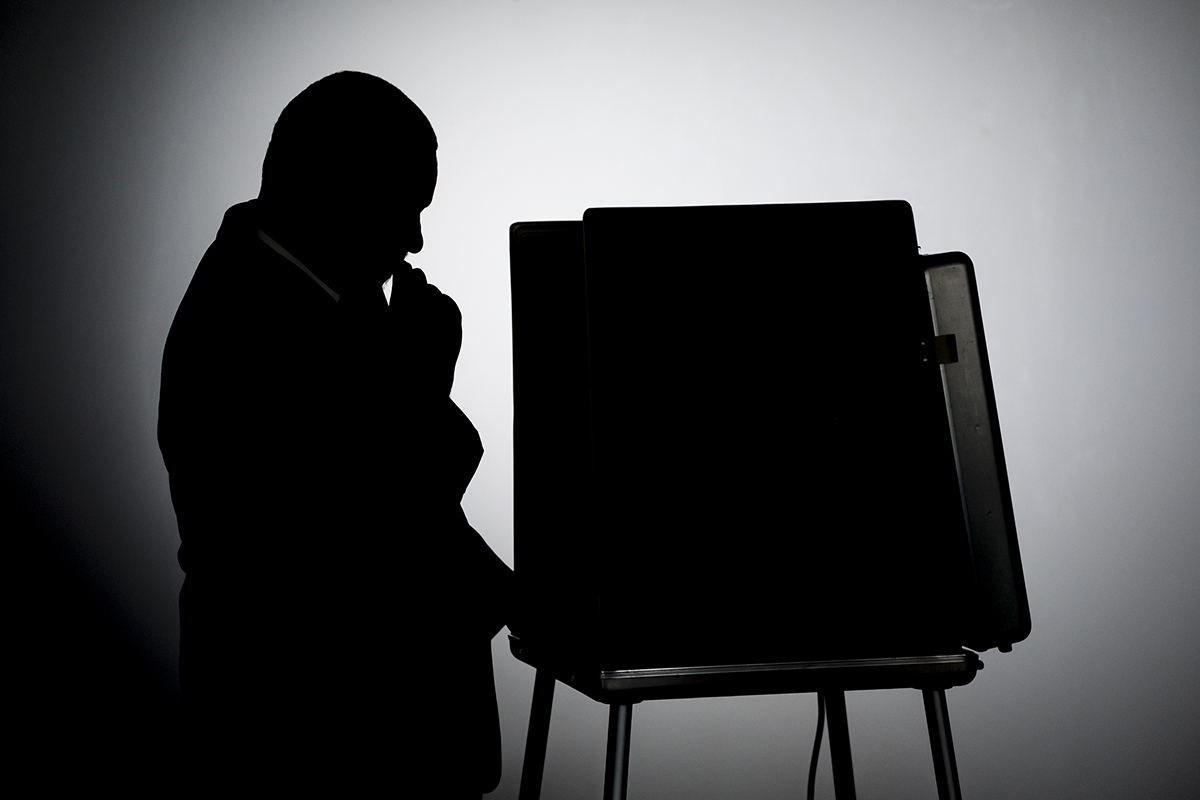Voters in California, Maine, and Texas will decide statewide ballot measures related to elections on Nov. 4, 2025. In addition, voters in several cities, including New York City, will also be deciding measures related to election policy.
California Proposition 50
California voters will decide on Proposition 50, which would authorize the state to use a new, legislature-drawn congressional district map for 2026 through 2030. Under Prop. 50, five Republican-held districts would shift to become more Democratic, based on the 2024 presidential election results. The Citizens Redistricting Commission would redraw congressional districts in 2031, following the 2030 U.S. census.
Gov. Gavin Newsom (D) said that the ballot measure is intended to counter a mid-cycle redistricting proposal in Texas, which would, according to The Texas Tribune, “[position] the GOP to net up to five additional seats in Texas." Newsom said Prop. 50, “will nullify what happens in Texas.”

Prop. 50 recently became the sixth-most expensive ballot measure in the state’s history. As of Oct. 21, about $148.7 million had been raised for and against Prop. 50. Supporters received $105.0 million, while opponents received $43.7 million. Prop. 50 was endorsed by former President Barack Obama (D), former Vice President Kamala Harris (D), and the Democratic Party of California. It is opposed by former Gov. Arnold Schwarzenegger (R) and the California Republican Party. For a full list of endorsements and arguments for and against the measure, see here.
Texas Proposition 16
Texans will be deciding Proposition 16, which would provide that "persons who are not citizens of the United States" cannot vote in Texas. While state law requires that residents must attest to being a citizen when registering to vote, Prop. 16 would amend the Texas Constitution, meaning future changes would be subject to a two-thirds legislative vote and voter approval.
Gov. Greg Abbott (R), speaking in support of the amendment, said the amendment “makes it crystal clear that if you are not a United States citizen, you’re not allowed to vote in Texas.”
Shannon Halbrook of Every Texan, an organization opposing the amendment, said, “This amendment is unnecessary and purely performative. Non-citizens cannot vote in U.S. elections.”
Federal law prohibits noncitizens from voting in federal elections. Washington, D.C., and municipalities in three states—California, Maryland, and Vermont—allow noncitizens to vote in at least some local elections. Heading into the election, 14 states have approved amendments related to adding language about citizenship requirements for voting, including three citizen-initiated measures.
Maine Question 1
Maine voters will be deciding Question 1, which would require voters to present photo identification for both in-person and absentee voting, and would also change the rules for absentee voting and election ballot drop boxes.
Some of the changes to absentee voting would include requiring voters to complete an identification envelope with their identification number, name, birth date, address, and the election type and date; allowing absentee ballots to be challenged if a signature does not match the voter’s registration record; prohibiting prepaid postage on return absentee ballot envelopes; repealing provisions allowing disabled and senior voters (65 and older) to receive absentee ballots for each election without submitting a new request; and limiting each local government to one ballot drop box.
State Rep. Laurel Libby (R-90), who supports Question 1, said, "Maine people are reasonable. They want to have confidence that we have strong elections in our state and they understand that requiring an ID to vote is not radical. It’s not extreme. It’s common sense."
Maine Secretary of State Shenna Bellows (D), who opposes Question 1, said, "The citizens initiative presented to us today has so much more that is really problematic. It is a wolf in sheep’s clothing … I think reasonable people may agree on what should be required on Election Day. But this is not that. This is somewhat shocking in the changes it seeks to make to absentee voting."
Between 2004 and 2024, voters in nine states decided on 10 ballot measures related to voter ID, with eight (80%) being approved. Maine Question 1 is unique among these other measures because it makes changes to absentee voting and ballot drop box rules in addition to requiring voter ID. The support campaign is called Voter ID for ME, while the opposition campaign is called Save Maine Absentee Voting.
Local election-related ballot measures
Voters will be deciding local ballot measures related to elections in New York City, as well as in Greenbelt, Maryland, and Virginia Beach, Virginia.
In New York City, Question 6 would move the city’s primary and general elections from odd-numbered years to even-numbered years, to coincide with federal presidential elections. This would affect the elections for mayor, comptroller, public advocate, city council members, and borough presidents. However, the change could not take effect unless the state legislature also amends Section 8 of Article XIII of the New York Constitution, and voters approve that amendment.
Grace Rauh, the executive director of Citizens Union, said, "Nearly three times as many New Yorkers vote for president than for mayor. For far too long, off-cycle elections have produced record-low turnout and an electorate that does not reflect the diversity of our city. Moving our elections to even years would significantly enhance turnout, make our elections more representative, and save us millions in election administration costs."
Errol Louis, a columnist for New York Magazine, said, "The main problem with 'one big election' is that national political dynamics would inevitably cause vital city issues unique to New York to get swallowed, distorted, or ignored... The last thing we need is local candidates bloviating about funding Social Security or supporting NATO instead of telling us how they plan to improve trash pickups, improve the schools, or hire more social workers to help the homeless."
On the statewide level, the majority of U.S. states (45 of them) hold even-numbered year elections for governor and other executive offices. Five states—Kentucky, Louisiana, Mississippi, New Jersey, and Virginia—hold off-cycle statewide elections for governor and other executive offices, while four of these states (all except Kentucky) also hold off-year state legislative elections. At the city level, six cities out of the top 25 U.S. cities—Los Angeles, Phoenix, San Diego, Austin, San Francisco, Washington, D.C.—hold elections at even-numbered years. Meanwhile, of the top 25 cities, the remaining 17 cities hold elections in odd years.
In Greenbelt, Maryland, voters will decide on an advisory question regarding ranked-choice voting for city council members. A ranked-choice voting system (RCV) is an electoral system in which voters rank candidates by preference on their ballots. Currently, three states use RCV statewide: Alaska and Maine use it in some federal and statewide elections, while Hawaii uses it for certain statewide elections. Fourteen states contain localities that use RCV in municipal elections, and seventeen states have adopted laws prohibiting the use of RCV in any elections.
Virginia Beach voters will decide on a measure that would request the state legislature to amend the city charter to change how the city council and mayor are elected. The amendment would provide for 10 single-member districts where voters elect one member from their respective districts and provide that the mayor would be elected at large. This system is called the 10-1 system. Currently, the charter provides for the at-large citywide election of all city council members and the mayor, with seven city council members representing residence districts and three city council members representing the city at-large. Election Day is on Nov. 4, 2025. Across the U.S., voters in nine states will be deciding a total of 30 statewide measures.



